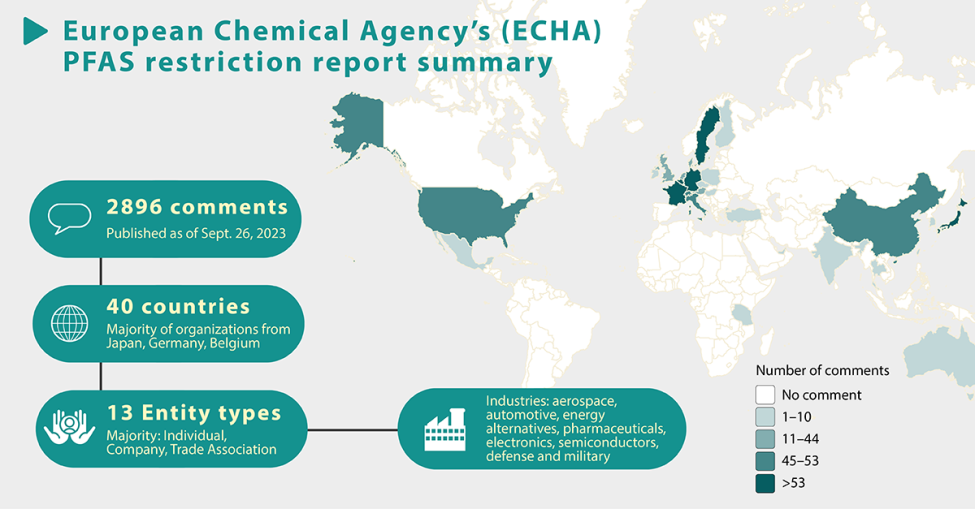September 26, 2023
The European Chemical Agency's draft PFAS regulation generated thousands of comments from a variety of entities, industries, and countries
On Sept. 25, the consultation period closed for the European Chemical Agency's (ECHA) draft REACH Annex XV restriction report for per- and polyfluoroalkyl substances (PFAS). ECHA first released a proposal from five EU Member States that would restrict the manufacture and use of PFAS as a chemical class, with significant implications for PFAS-containing products throughout the EU.
As of Sept. 26, the proposed restrictions on the manufacture and use of PFAS in the EU received over 2,800 comments from entities such as companies, trade associations, research institutes, individuals, and confidential parties since its opening date on March 22, 2023. In addition to the submissions made by entities from the EU (54%, excluding individuals), other countries also submitted comments, including Japan (36%), China (3%), the U.S. (3%), the U.K. (2%), and South Korea (0.5%).
Submissions represented a variety of industry sectors, including aerospace, automotive, defense and military, pharmaceuticals, energy alternatives, electronics, and semiconductors. While specific PFAS compounds were identified in some comment submissions, the comments generally focused on compounds that can be described as fluoropolymers or fluoroelastomers, non-polymers (i.e., fluorosurfactants), and fluorinated gases.
Compared to other ECHA-proposed REACH restrictions, the new proposed EU restrictions on PFAS have produced a notably higher response rate in the consultation period than has been observed in prior consultation periods for other chemical families, such as bisphenols (16 times higher), microplastics (6 times higher), or polycyclic aromatic hydrocarbons (PAHs, 93 times higher).
ECHA is responsible for implementing chemicals legislation in the EU to protect human health and the environment. The close of the consultation period for the PFAS restriction proposal brings the EU one step closer to passing wide-ranging legislation by vote expected in 2025, with the restriction becoming effective in 2026 or later.

What Can We Help You Solve?
Exponent closely monitors the continually changing PFAS regulatory landscape to help clients prepare for new PFAS regulations. Our experts have years of experience investigating supply chains for PFAS sources, working with third-party laboratories to test materials and products for specific PFAS and total organic fluorine, and assisting clients in making decisions that suit their product lines and stewardship goals.

PFAS Consulting Services
Manage PFAS in your products, supply chains, and waste streams.

Sustainability
Meet changing sustainability regulations with rigorous science and experienced consulting services.

Product Stewardship
Overcome business and regulatory challenges at every stage, from research and design to disposal and recycling.

Regulation & Safety of Personal Care Products
Ensure safe, high-quality personal care products with experienced consulting expertise.

Polymers Expertise for Consumer Products
Rigorous testing and analysis of polymers in consumer products.





![SOFTWARE & COMPUTER ENGINEERING [EECS]](/sites/default/files/styles/filter_content/public/media/images/GettyImages-1341115371.jpg?itok=HpAoCB5K)